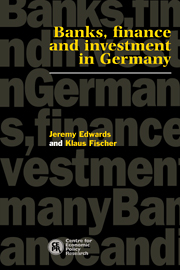Book contents
- Frontmatter
- Contents
- List of figures
- List of tables
- Preface
- 1 Introduction
- 2 A theoretical framework for analysing the effects of the financial system on economic performance
- 3 The significance of bank loans in the finance of aggregate investment in Germany
- 4 Legal forms of enterprise in Germany, and their implications for the role of the German financial system
- 5 The structure of the German banking system
- 6 Bank supervisory board representation and other aspects of German bank lending to firms
- 7 German bank behaviour when firms are in financial distress
- 8 The ownership structure of large German firms, and its implications for German banks' corporate control role
- 9 Do German banks act as delegated exercisers of equity's control rights?
- 10 Conclusion
- Bibliography
- Index
10 - Conclusion
Published online by Cambridge University Press: 02 November 2009
- Frontmatter
- Contents
- List of figures
- List of tables
- Preface
- 1 Introduction
- 2 A theoretical framework for analysing the effects of the financial system on economic performance
- 3 The significance of bank loans in the finance of aggregate investment in Germany
- 4 Legal forms of enterprise in Germany, and their implications for the role of the German financial system
- 5 The structure of the German banking system
- 6 Bank supervisory board representation and other aspects of German bank lending to firms
- 7 German bank behaviour when firms are in financial distress
- 8 The ownership structure of large German firms, and its implications for German banks' corporate control role
- 9 Do German banks act as delegated exercisers of equity's control rights?
- 10 Conclusion
- Bibliography
- Index
Summary
The view that the German system of finance for investment has made an important contribution to German economic success is widespread, as was documented in chapter 1. Conventional wisdom emphasises the importance of a number of characteristic institutional features of the bank-based system of investment finance in Germany, which are seen as leading to greater availability of external finance at a lower cost than in the UK system. These institutional features are: the universal nature of most German banks; the house bank relationship between particular firms and particular banks; bank representation on the supervisory boards of companies; and the ability of banks to exercise proxy votes at meetings of shareholders in companies on behalf of shareholders who have deposited their shares with the banks for safekeeping. It is widely argued that the German system of finance for investment is unambiguously superior to that of the UK, and that UK investment and growth performance would improve if the UK adopted a system of investment finance more like the German one.
Although this view is widespread, it is based on very limited evidence, as chapter 1 points out. Much of this evidence takes the form of simple correlations, involving the observation that Germany's investment and growth record has been better than the UK's, and that the German system of investment finance is different from the UK system. This ignores the fact that there are many other differences between Germany and the UK which might influence economic performance. To name just two examples, Germany has a different system of education and training and, at least in the post-1948 period, a different, and more stable, macroeconomic policy.
- Type
- Chapter
- Information
- Banks, Finance and Investment in Germany , pp. 228 - 240Publisher: Cambridge University PressPrint publication year: 1994



